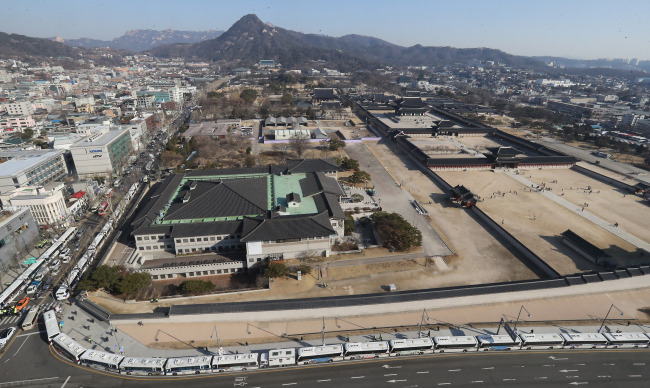Chronology of major events leading to Park's ouster
By Park Ju-youngPublished : March 10, 2017 - 10:50
The following is the chronology of the major events leading to the Constitutional Court's ruling Friday to remove President Park Geun-hye from office over a scandal that also involves her longtime friend Choi Soon-sil and other close associates.

Oct. 24: Cable TV network JTBC unveils a tablet PC presumed to be used by Choi and reports allegations of her receiving and editing drafts of presidential speeches.
Oct. 25: Park apologizes over leak of presidential speeches to Choi.
Oct. 27: State prosecution establishes a special task force to investigate allegations surrounding Park and Choi.
Oct. 29: Liberal civic groups hold first anti-Park candlelight rally. Prosecutors attempt to raid the presidential office Cheong Wa Dae, but are denied entry.
Oct. 30: Park accepts the resignations of her secretaries Woo Byung-woo, An Chong-bum, Lee Jae-man, Jeong Ho-seong and Ahn Bong-geun. Choi returns to Korea from Europe.
Oct. 31: Choi is put into emergency detention after hours of questioning by prosecutors.
Nov. 3: Choi is formally arrested by prosecutors.
Nov. 4: Park delivers a second national address, says she will accept investigation into the scandal.
Nov. 6: Ex-presidential secretaries An and Jeong are formally arrested. Former senior presidential aide Woo undergoes questioning.
Nov. 8: Prosecutors raid offices of Samsung Electronics Co.
Nov. 14: The National Assembly passes a bill for an independent counsel to investigate the scandal.
Nov. 20: Choi is indicted along with Park's former aides An and Jeong. Prosecutors name Park as a criminal suspect claiming she colluded with them.
Nov. 29: Park delivers third national address, calls on parliament to determine her fate as president.
Nov. 30: Prosecutor-turned-lawyer Park Young-soo is appointed independent counsel.
Dec. 6: The National Assembly questions business tycoons over scandal in first parliamentary hearing on it.
Dec. 9: The National Assembly passes an impeachment motion against Park by the overwhelming majority of 234-56. Park is accused of letting Choi meddle in state affairs and colluding with her to extort millions of dollars from local conglomerates, including Samsung Group. The impeachment resolution is sent to the Constitutional Court for review.
Dec. 11: Justice Kang Il-won is designated as the lead justice for the impeachment trial.
Dec. 14: The Constitutional Court decides to begin proceedings in the impeachment trial.
Dec. 15: The court requests the submission of investigation records from state prosecutors and an independent counsel on the corruption scandal that led to Park's impeachment.
Dec. 16: Park submits a written statement at the court's request to deny all of the charges against her.
Dec. 21: Independent Counsel Park launches investigation.
Dec. 31: Former head of state pension fund Moon Hyung-pyo is formally arrested.
Dec. 22: The court holds its first preparatory hearing in the impeachment trial.
2017
Jan. 1: Park meets with the presidential office press corps during which she denies her charges.
Jan. 3: The court holds its first formal hearing in the impeachment trial in Park's absence.
Jan. 9: Parliamentary committee on the influence-peddling scandal holds its final hearing.
Jan. 16: Choi appears at the fifth hearing of the trial after being summoned a second time. She denies any wrongdoing.
Jan. 21: Culture Minister Cho Yoon-sun and ex-presidential chief of staff Kim Ki-choon are arrested over allegations of creating and managing a blacklist of artists critical of the government. Cho resigns from the post.
Jan. 25: Outgoing Chief Justice Park Han-chul says the court should deliver its ruling by March 13, when another justice is set to retire upon completing her term. Park again rebuts her charges in an interview with a conservative online media outlet.
Jan. 31: Chief Justice Park Han-chul retires after completing his term, reducing the number of justices to eight.
Feb. 2: Special prosecutors attempt to raid the presidential office Cheong Wa Dae, but are denied entry again.
Feb. 7: Ex-Culture Minister Cho Yoon-sun and former presidential chief of staff Kim Ki-choon are indicted over the artist blacklist.
Feb. 16: Acting Chief Justice Lee Jung-mi announces that the final hearing will be held on Feb. 24.
Feb. 17: Samsung's de facto leader Lee is arrested on multiple corruption charges, including bribery and embezzlement.
Feb. 22: The court postpones the final hearing to Feb. 27 after Park's lawyers request it be delayed to early March. Park's lawyers petition for the removal of Justice Kang Il-won, claiming he is biased toward parliament. The court dismisses the request.
Feb. 27: The court holds the final hearing of the trial. Park is absent but makes her final argument in a statement. She pleads innocent. Acting President and Prime Minister Hwang Kyo-ahn refuses to extend the investigation period.
Feb. 28: Park Young-soo's team wraps up its investigation, indicting 17 more suspects including Samsung's Lee Jae-yong. A total of 30 suspects have been indicted since the launch of the independent investigation.
March 6: Independent Counsel Park announces the results of an investigation into the scandal. President Park is named an accomplice of Choi in taking bribes from Samsung in exchange for business favors.
March 8: The court announces it will deliver its ruling at 11 a.m. on March 10.
March 10: The court delivers its ruling.
(Yonhap)











![[Today’s K-pop] BTS pop-up event to come to Seoul](http://res.heraldm.com/phpwas/restmb_idxmake.php?idx=644&simg=/content/image/2024/04/17/20240417050734_0.jpg&u=)
![[Graphic News] More Koreans say they plan long-distance trips this year](http://res.heraldm.com/phpwas/restmb_idxmake.php?idx=644&simg=/content/image/2024/04/17/20240417050828_0.gif&u=)




![[KH Explains] Hyundai's full hybrid edge to pay off amid slow transition to pure EVs](http://res.heraldm.com/phpwas/restmb_idxmake.php?idx=652&simg=/content/image/2024/04/18/20240418050645_0.jpg&u=20240419100350)

